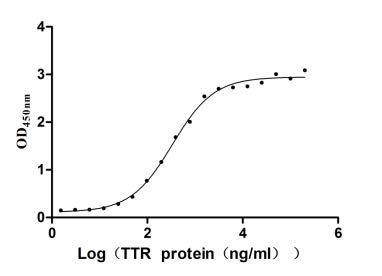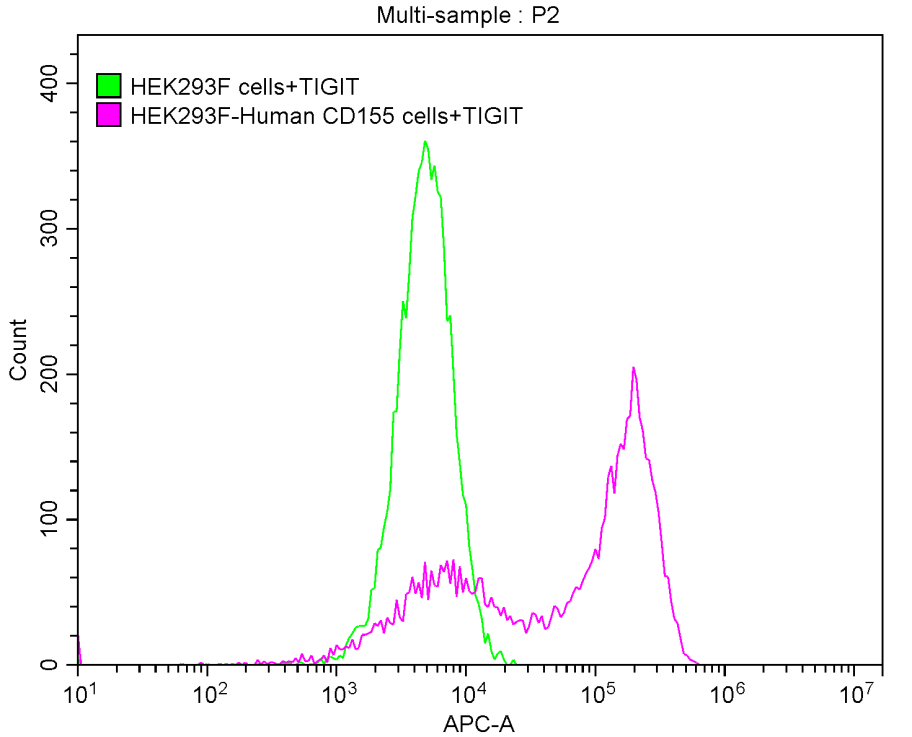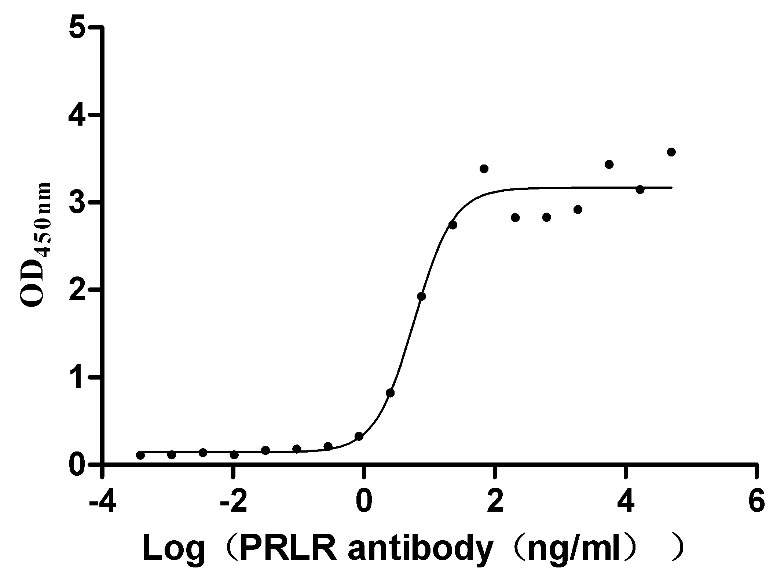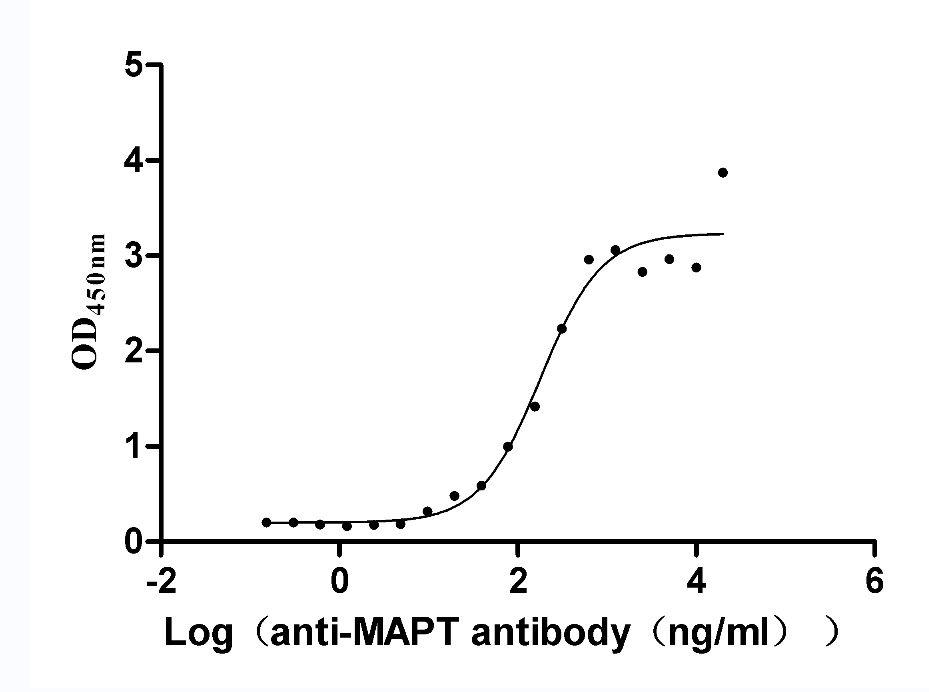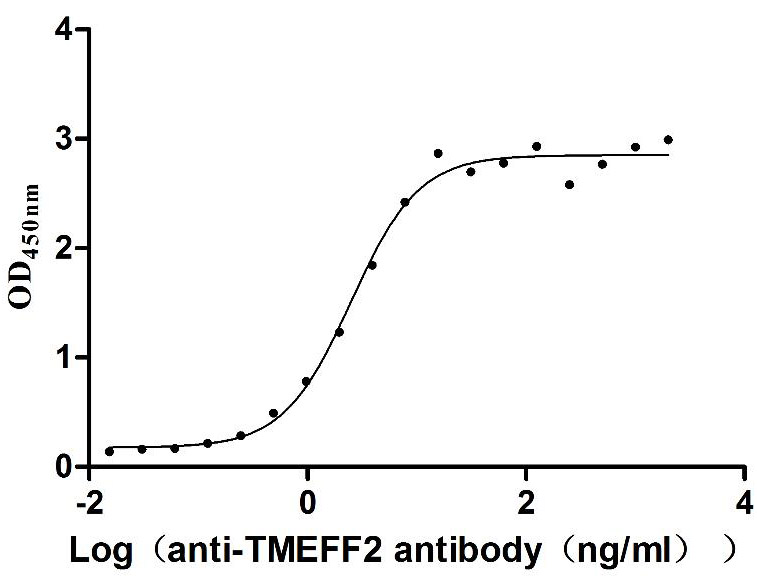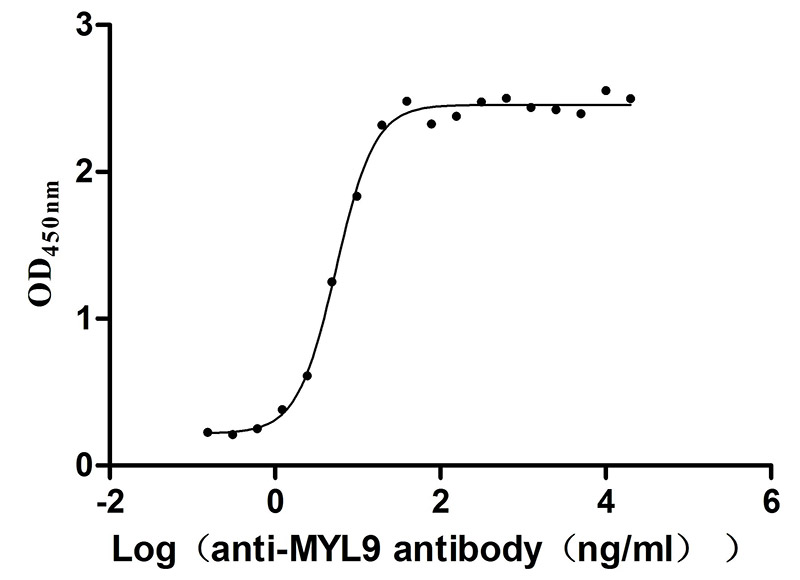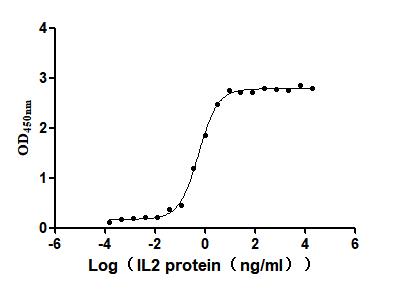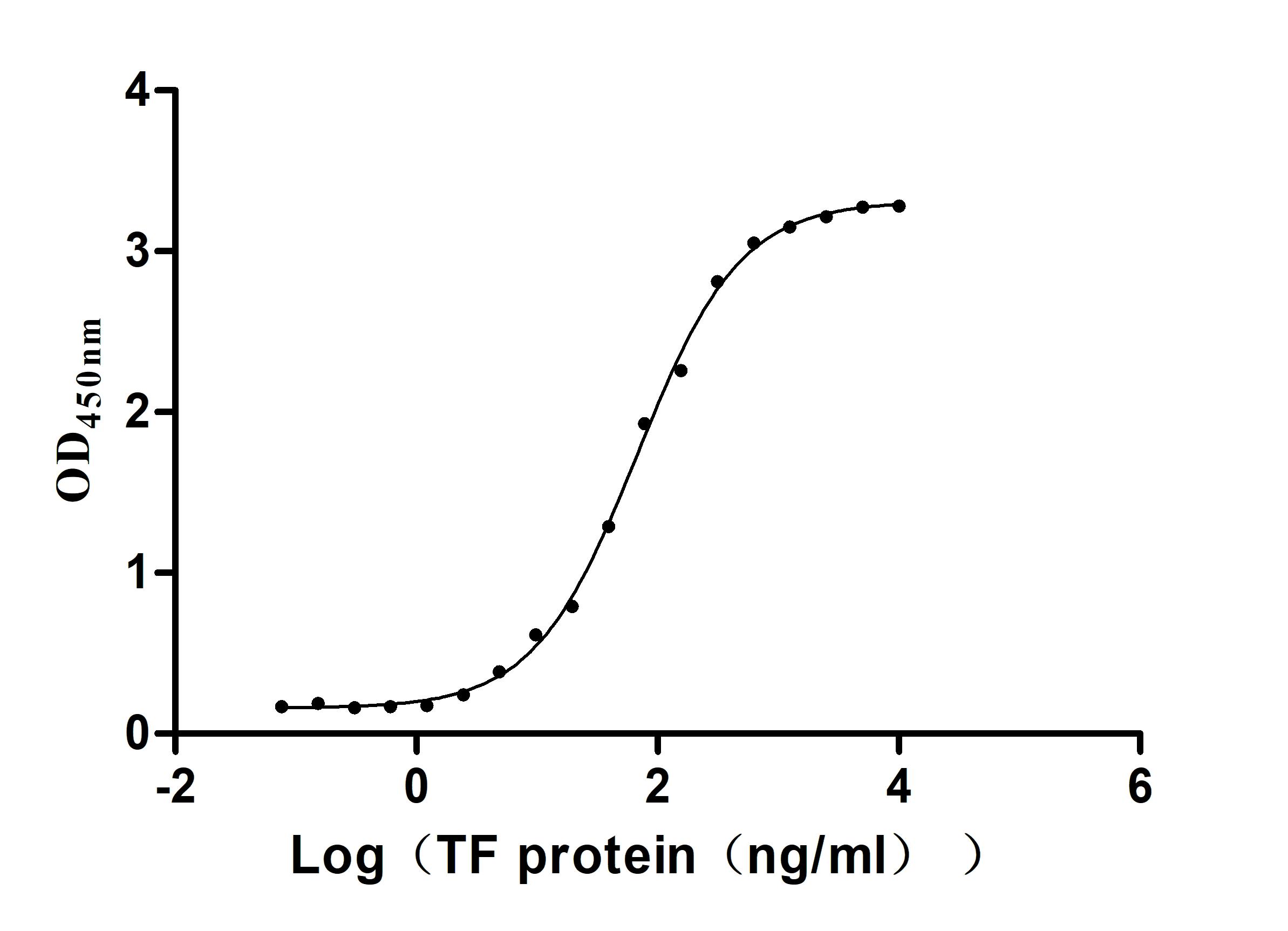Recombinant Human Pulmonary surfactant-associated protein C (SFTPC)
-
货号:CSB-BP021174HU
-
规格:
-
来源:Baculovirus
-
其他:
-
货号:CSB-EP021174HU-B
-
规格:
-
来源:E.coli
-
共轭:Avi-tag Biotinylated
E. coli biotin ligase (BirA) is highly specific in covalently attaching biotin to the 15 amino acid AviTag peptide. This recombinant protein was biotinylated in vivo by AviTag-BirA technology, which method is BriA catalyzes amide linkage between the biotin and the specific lysine of the AviTag.
-
其他:
产品详情
-
纯度:Greater than 85% as determined by SDS-PAGE.
-
基因名:SFTPC
-
Uniprot No.:
-
别名:BRICD6; BRICHOS domain containing 6; PSP C; PSPC; PSPC_HUMAN; Pulmonary surfactant apoprotein 2; Pulmonary surfactant apoprotein PSP C; pulmonary surfactant apoprotein-2 SP-C; Pulmonary surfactant associated protein C; Pulmonary surfactant associated proteolipid SPL pVal; Pulmonary surfactant associated proteolipid SPL(Val); Pulmonary surfactant protein SP5; Pulmonary surfactant-associated protein C; Pulmonary surfactant-associated proteolipid SPL(Val); SFTP 2; SFTP2; SFTPC; SFTPC surfactant pulmonary associated protein C; SMDP2; SP 5; SP C; SP-C; SP5; SPC; Surfactant associated protein pulmonary 2; Surfactant protein c; Surfactant proteolipid SPL-pVal; Surfactant pulmonary associated protein C
-
种属:Homo sapiens (Human)
-
表达区域:24-58aa
-
氨基酸序列FGIPCCPVHLKRLLIVVVVVVLIVVVIVGALLMGL
-
蛋白标签:Tag type will be determined during the manufacturing process.
The tag type will be determined during production process. If you have specified tag type, please tell us and we will develop the specified tag preferentially. -
产品提供形式:Lyophilized powder
Note: We will preferentially ship the format that we have in stock, however, if you have any special requirement for the format, please remark your requirement when placing the order, we will prepare according to your demand. -
复溶:We recommend that this vial be briefly centrifuged prior to opening to bring the contents to the bottom. Please reconstitute protein in deionized sterile water to a concentration of 0.1-1.0 mg/mL.We recommend to add 5-50% of glycerol (final concentration) and aliquot for long-term storage at -20℃/-80℃. Our default final concentration of glycerol is 50%. Customers could use it as reference.
-
储存条件:Store at -20°C/-80°C upon receipt, aliquoting is necessary for mutiple use. Avoid repeated freeze-thaw cycles.
-
保质期:The shelf life is related to many factors, storage state, buffer ingredients, storage temperature and the stability of the protein itself.
Generally, the shelf life of liquid form is 6 months at -20°C/-80°C. The shelf life of lyophilized form is 12 months at -20°C/-80°C. -
货期:Delivery time may differ from different purchasing way or location, please kindly consult your local distributors for specific delivery time.Note: All of our proteins are default shipped with normal blue ice packs, if you request to ship with dry ice, please communicate with us in advance and extra fees will be charged.
-
注意事项:Repeated freezing and thawing is not recommended. Store working aliquots at 4°C for up to one week.
-
Datasheet :Please contact us to get it.
相关产品
靶点详情
-
功能:Pulmonary surfactant associated proteins promote alveolar stability by lowering the surface tension at the air-liquid interface in the peripheral air spaces.
-
基因功能参考文献:
- S186N polymorphism associated with severity of preterm neonate respiratory distress PMID: 27884070
- a novel mutation in SFTPC [c.435G->A, p.(Gln145)] that was associated with onset of symptoms in early infancy, progressive respiratory failure with need for prolonged support, and eventual lung transplant at 1 year of age (Review) PMID: 27362365
- c.435G>C variant in the SFTPC gene associated with fatal neonatal respiratory distress syndrome. The c.435G>C mutation is deleterious not because of its amino acid substitution but because of its subsequent splicing defect and should be referred to as r.325_435del and p.Leu109_Gln145del. PMID: 28295039
- an intricate link between caveolin-1 and Src kinase-mediated cell signaling and alveolar epithelial cell apoptosis due to loss of SP-C expression through p53 and uPA system-mediated cross-talk, is reported. PMID: 28385810
- Rare mutations in surfactant-associated genes contribute to neonatal respiratory distress syndrome. The frequency of mutations in these genes in the Chinese population is unknown. We resequenced all exons of the surfactant protein-C (SFTPC) and we did not find any rare mutations in SFTPC PMID: 26547207
- In interstitial lung disease, abnormal proSP-C was seen in small and dense lamellar bodies in type II alveolar epithelial cells. A549 cells expressing proSP-C(L55F) had abnormal organelles. It partly colocalized in CD63-positive cytoplasmic vesicles . PMID: 26375473
- We sequenced SFTPC and analyzed morphology, ultrastructure and SP expression in lung tissue when available. We identified eight subjects who were heterozygous for SP-C mutations. PMID: 25782673
- analysis of clinical patterns in patients with SFTPC mutations PMID: 25657025
- support a chaperone function of the BRICHOS domain, possibly together with the linker region, during pro-SP-C biosynthesis in the endoplasmic reticulum PMID: 26041777
- cleavage of BRICHOS in a loop region that is cleaved during proSP-C biosynthesis results in increased capacity to delay Abeta(42) fibril formation. PMID: 25891900
- Structural modeling of transmembrane (BRICHOS) domains of SFTPC precursor and BRI2/ITM2B (integral membrane protein 2B) identifies conserved region structurally complementary to beta-sheet-/amyloid-prone regions in BRICHOS domain-containing proteins. PMID: 24099305
- The A116D mutation leads to impaired processing of proSP-C in alveolar epithelial cells, alters cell viability and lipid composition, and also activates cells of the immune system. PMID: 22458263
- (surfactant protein C), a specific functional marker of human type II alveolar epithelial cells, was detected in differentiated cells by RT-PCR (reverse transcription-PCR) analysis after day 15. PMID: 21542803
- Several genetic abnormalities have been associated with familial pulmonary fibrosis. The present study examined the genes coding for surfactant protein-C, ATPbinding cassette protein A3 and telomerase, and found no abnormalities. PMID: 21165348
- Mutation increases endoplasmic reticulum stress and induces apoptotic cell death compared with wild-type SP-C in alveolar type II cells, supporting the significance of this mutation in the pathogenesis of pulmonary fibrosis. PMID: 21828032
- Data show that, in contrast to its wild-type counterpart, SP-C(I73T) is misdirected to the plasma membrane and subsequently internalized to the endocytic pathway via early endosomes, leading to the accumulation of abnormally processed proSP-C isoforms. PMID: 21707890
- Our study indicates that missense single nucleotide polymorphisms and haplotypes of SFTPA1, SFTPA2 and SFTPD are associated with susceptibility to community-acquired pneumonia(CAP), and that several haplotypes also influence severity and outcome of CAP. PMID: 21310059
- misfolded surfactant protein C has a role in endoplasmic reticulum stress in epithelial-mesenchymal transition of alveolar epithelial cells PMID: 21169555
- sequencing of the five translated exons of the SFTPC gene1 from blood samples demonstrated the same heterozygous I73T substitution in both the child and the mother; neither of them had mutation of the SFTPB and ABCA3 genes. PMID: 21248320
- JNK signaling has a role in mediating SP-C BRICHOS-induced cytokine release PMID: 20463293
- children with SFTPC mutation associated lung diseases have HRCT pattern that were characterized by ground-glass opacities that were predominately diffuse but can be patchy in some cases and lung cysts with thin wall and different sizes. PMID: 20658481
- Mutations in the gene encoding surfactant protein C (SFTPC) have been found in children and families with idiopathic pneumonias PMID: 20656946
- I73T mutation of SFTPC protein leads to impaired processing of proSP-C in alveolar type II cells, alters their stress tolerance and surfactant lipid composition, and activates cells of the immune system. PMID: 21092132
- Reduced SFTPC transcription contributes to the genetic risk for neonatal respiratory distress syndrome in developmentally susceptible infants. PMID: 20539253
- two novel mutations were identified in highly conserved areas of the SFTPC gene, and show that heterozygotes for the mutations have normal lung function and are unaffected by COPD and interstitial lung disease. PMID: 19910179
- Although neonatal presentation may be observed in some patients with mutations in the BRICHOS domain, surfactant protein C gene (SFTPC)-associated lung disease usually presents within the first months of life with cough, tachypnoea and failure to thrive. PMID: 20403820
- The human SP-C promoter sequence will enhance gene expression specifically in alveolar type II epithelial cells in mouse lung. PMID: 20054353
- Subclinical fibrotic changes may be present in family members of patients with SFTPC mutation-associated interstitial lung disease and suggest ABCA3 variants could affect disease pathogenesis. PMID: 20371530
- SFTPC SNP rs4715 associates with the duration of preterm premature rupture of fetal membranes, and SP-C is expressed in gestational tissues. We propose that fetal SFTPC moderates inflammatory activation within the fetal extra-embryonic compartment PMID: 19735006
- Data show that knockdown of MKS3 inhibited degradation of mutant SP-C. PMID: 19815549
- review of synthesis and post-translational processing of surfactant protein C PMID: 11699575
- mutations causally related to familial interstitial lung disease PMID: 11893657
- Biosynthesis of surfactant protein C (SP-C). Sorting of SP-C proprotein involves homomeric association via a signal anchor domain PMID: 11907042
- associated with usual interstitial pneumonitis and cellular nonspecific interstitial pneumonitis in one kindred PMID: 11991887
- role of cathepsin H in processing in pneumocytes PMID: 12034564
- surfactant protein C processing requires a type II transmembrane topology directed by juxtamembrane positively charged residues PMID: 12933801
- surfactant protein C has a role in interstitial lung disease and lung development PMID: 14525980
- An incompletely processed form of SP-C precursor found in association with childhood SP-B deficiency associates with surfactant phospholipids and is secreted into the airspaces with the large aggregate form of surfactant, but it lacks surface activity. PMID: 15049696
- Observations suggest that individuals with this particular mutation in surfactant protein C gene might be at increased risk of interstitial lung disease of variety of types. PMID: 15133475
- NMR solution structure and analysis of potential C-terminal dimerization site of a recombinant mutant of surfactant-associated protein C. PMID: 15153097
- Missense mutation of the surfactant protein C gene is associated with interstitial lung disease in newborn. PMID: 15293602
- proSP-C BRICHOS mutations induce a dynamic toxic gain-of-function, causing apoptotic cell death both by early ER accumulation leading to an exaggerated unfolded protein response and by enhanced deposition of cellular aggregates associated with proteasome PMID: 15778495
- Infection of cells expressing mutant SP-C with respiratory syncytial virus resulted in significantly enhanced cytotoxicity associated with accumulation of the mutant proprotein, pronounced activation of the unfolded protein response, and cell death. PMID: 16449190
- Erm is involved in SP-C regulation, which results from an interaction with TTF-1 PMID: 16613858
- Recombinant SP-C forms improved movement of phospholipid molecules into the interface (during adsorption), or out from the interfacial film (during compression) PMID: 16631109
- Brichos domain-containing C-terminal part of pro-surfactant protein C binds to an unfolded poly-val transmembrane segment PMID: 16709565
- The influence of palmitoylation was studied for full length SP-Cs as well as truncated variants with the N-terminal residues 1-17 and 1-13, respectively. PMID: 17051367
- an inverse SFTPC haplotype distribution was found between children with asthma and respiratory syncytial virus infection PMID: 17121584
- These results suggest common cellular responses, including initiation of cell-death signaling pathways, to these lung disease-associated SP-C BRICHOS domain proteins. PMID: 17586700
- finding of heterozygosity for ABCA3 mutations in severely affected infants with SFTPC I73T, and independent inheritance from disease-free parents supports that ABCA3 acts as a modifier gene for the phenotype associated with an SFTPC mutation. PMID: 17597647
显示更多
收起更多
-
相关疾病:Pulmonary surfactant metabolism dysfunction 2 (SMDP2); Respiratory distress syndrome in premature infants (RDS)
-
亚细胞定位:Secreted, extracellular space, surface film.
-
数据库链接:
HGNC: 10802
OMIM: 178620
KEGG: hsa:6440
STRING: 9606.ENSP00000316152
UniGene: Hs.1074
Most popular with customers
-
Recombinant Human Transthyretin (TTR) (Active)
Express system: Mammalian cell
Species: Homo sapiens (Human)
-
Recombinant Human T-cell immunoreceptor with Ig and ITIM domains (TIGIT), partial (Active)
Express system: Mammalian cell
Species: Homo sapiens (Human)
-
Recombinant Mouse Prolactin receptor (Prlr), partial (Active)
Express system: Mammalian cell
Species: Mus musculus (Mouse)
-
Recombinant Rat Microtubule-associated protein tau (Mapt) (Active)
Express system: Mammalian cell
Species: Rattus norvegicus (Rat)
-
Recombinant Human Tomoregulin-2 (TMEFF2), partial (Active)
Express system: Mammalian cell
Species: Homo sapiens (Human)
-
Recombinant Human Myosin regulatory light polypeptide 9 (MYL9) (Active)
Express system: Yeast
Species: Homo sapiens (Human)
-
Recombinant Human Interleukin-2 (IL2) (Active)
Express system: Mammalian cell
Species: Homo sapiens (Human)
-
Recombinant Human Serotransferrin(TF) (Active)
Express system: Mammalian cell
Species: Homo sapiens (Human)


